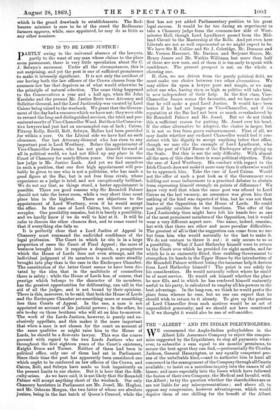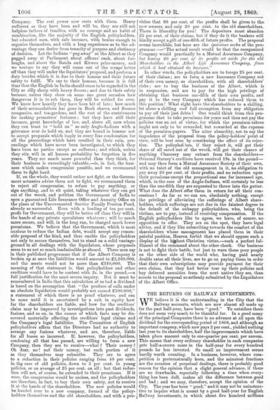THE " ALBERT " AND ITS INDIAN POLICYHOLDERS.
WE recommend the Anglo-Indian policyholders in the Albert Life Assurance Company to reject the compro- mise suggested by the Liquidators, to stop all payments what- ever, to subscribe a sum equal to six months' premiums, to secure the best agent they can find,—preferentially Sir Charles Jackson, General Hannyngton, or any equally competent per- son of the unbribable kind,—and to authorize him to hunt all concerned in the management of the Company through all Courts available ; to insist on a merciless inquiry into the causes bf all losses; and more especially into the losses which have followed the fusion of their own Company, the Medical and Invalid, with the Albert ; to try the question whether the shareholders are or are not liable for any misrepresentations ; and above all, to oppose any compromise, however advantageous, which would deprive them of one shilling for the benefit of the Albert
Company. The real power now rests with them. Heavy sufferers as they have been and will be, they are still not helpless fathers of families, with no courage and no habit of combination, like the majority of the English policyholders, but educated men, with safe incomes, with brains enough to organize themselves, and with a long experience as to the ad- vantage they can derive from tenacity of purpose and obstinacy of decision. Let the Indians "peg away" at the Albert as they pegged away at Parliament about officers' rank, about fur- loughs, and about the Banda and Kirwee prize-money, and we venture to say they will come out of the scrape better off than they will under the liquidators' proposal, and perform a duty besides which it is due to their honour and their future safety to fulfil. We say to their honour, because it is full time that the English in India should cease to be regarded in the City as silly sheep with heavy fleeces ; and due to their safety because, unless they show on some one great occasion how dangerous it is to rob them, they will be robbed for ever. We know how heavily they have been hit of late ; how much of their accumulations has gone in Bank shares, and finance companies, and tea-gardens, and the rest of the contrivances for making promoters' fortunes ; but they have still their incomes, great knowledge of law, and, above all, men whom they can trust to "hold on" as only Anglo-Indians with a grievance ever do hold on, and they are bound in honour not to accept proposals which imply in every line condonation for all the proceedings which have resulted in their ruin, pro- ceedings which have never been investigated, to which they have been no parties except as sufferers ; and which, unless they stir, will in all human probability be forgotten in five years. They are much more powerful than they think, for their business is exceedingly valuable,—is, in fact, the busi- ness which makes compromise possible, and we recommend them to fight hard.
If, on the whole, they would rather not fight, or the Govern- ment actuaries advise them not to fight, we recommend them to reject all compromise, to refuse to pay anything, or sign anything, and to sit quiet, taking whatever they can get out of the wreck, and petition the Government of India to open a guaranteed Life Insurance Office and Annuity Office on the plans of the Uncovena.nted Service Family Pension Fund, already so successful. Even with a loading of ten per cent. profit for Government, they will be better off than they will in the hands of any private speculators whatever ; will be much more secure, and will, in the long run, be charged much lower premiums. We believe that the Government, which is most anxious to reduce the Indian debt, would accept any reason- able proposal of the kind, and thus enable the policyholders not only to secure themselves, but to stand on a solid vantage- ground in all dealings with the liquidators, whose proposals seem to us not so much inadmissible as bsurd. These men say in their published programme that if the Albert Company is broken up at once the liabilities would amount to £3,260,000, and the assets would not be more than £310,000. The meaning of that statement is, that policyholders and other creditors would have to be content with 2s. in the pound,—a full justification for the most severe inquiry. But it must be remembered in India that this calculation of so bad a dividend is based on the assumption that "the produce of calls under an absolute liquidation wouldprobably not exceed £100.000," a statement of which there is no proof whatever, and can be none until it is ascertained by a suit in equity how far the shareholders are liable, and how far the creditors' claim may be improved by investigations into past dividends, fusions, and so on, in the course of which facts may be dis- covered materially affecting the creditors' legal claims and the Company's legal liabilities. The Committee of English policyholders affirm that the Directors had no authority to arrange any fusions whatever, and are, therefore, liable for all losses so incurred. If, however, the policyholders, condoning all that has passed, are willing to form a new Company, then they are to receive—what ? Their money Oh dear, no ! not their money, but such portion of it as they themselves may subscribe. They are to agree to a reduction in their policies ranging from 40 per cent. in thp case of old policies, down to 5 per cent. in young policies, or an average of 25 per cent. on all ; but that reduc- tion will not, of course, be extended to their premiums. If it were, the compromise would be useless, and the policyholders are therefore, in fact, to buy their own safety, not to receive it at the hands of the shareholders. The new policies would be handed over to a new company, formed of the policy- holders themselves and the old shareholders, and with a pro- vision that 80 per cent. of the profits shall be given to the new owners, and only 20 per cent. to the old shareholders. There is liberality for you! The depositors must abandon 25 per cent. of their claims, but if they do it the bankers will kindly accept a gift of one-fifth of future profits. The proposal seems incredible, but here are the ipsissinga verba of the pro- gramme :—" The actual result would be that the reorganized Company would practically be a Mutual Assurance Company, but having 20 per cent. of its profits set aside for .the old Shareholders in the Albert Life Assurance Company, from which it had obtained its business."
In other words, the policyholders are to forego 25 per cent. of their claims ; are to form a new Insurance Company out of their own money, as shareholders, with all shareholders' risks ; are to buy the business of the Albert, which la- in suspension, and are to pay for the high privilege of obtaining that business one-fifth of their own profits, and pay it to the very Company which has reduced them to this position ! What right have the shareholders to a shilling, let alone a shilling and full exemption from any obligation to pay off their just debts? One would think from this pro- gramme that to take premiums for years and then not pay thern policies was an act of virtue, for which the premium-takers ought not only to be rewarded, but rewarded at the expense of the premium-payers. The utter absurdity, not to say the impudence of the proposal from the policy-holders' point of view, will be best seen by considering the effect of its rejec- tion. The policyhollers, if they reject it, will get their share of all saved out of the wreck, will get their chance of anything Chancery may extract from the shareholders- Overend Gurney's creditors have received 19s. in the pound-- and may then form a Mutual Assurance Society of their own, with no taint of the old management in it, no obligation to pay away 20 per cent. of their profits, and no reduction upon their premiums except the proportional one for increased age, which, in the case of the Anglo-Indians, will certainly be leas than the one-fifth they are requested to throw into the gutter. What does the Albert offer them in return for all their con- cessions As far as we can see, absolutely nothing, except the privilege of alleviating the sufferings of Albert share- holders, which sufferings are not due in the faintest degree to the default of the unhappy policyholders, who, being the- victims, are to pay, instead of receiving compensation. If the- English policyholders like to agree, we have, of course, no, opposition to offer. They are on the spot, they have legal advice, and if they like subscribing towards the comfort of the shareholders whose management has placed them in their- painful position, Heaven forbid that we should oppose such a display of the blithest Christian virtue,--such a perfect ful- filment of the command about the other cheek. Our business- is not to fight their battle, but just to warn those poor people on the other side of the world who, having paid nearly double rates all their lives, are to go on paying them in order that their own subscriptions may provide payment for their own claims, that they had better tear up their policies and buy deferred annuities from the next native they see, than- accede to the proposal so artlessly submitted by the Liquidators of the Albert Office.































 Previous page
Previous page